On this Day in History ... 19th August
19 Aug is in August.
1553 Trial and Execution of Lady Jane Grey's Supporters
1560 Death of Francis II King France Charles IX Succeeds
1565 Marriage of Richard Keyes and Mary Grey
Events on the 19th August
Anglo-Saxon Chronicle. 768. This year died King Eadbert, the son of Eata, on the fourteenth day before the calends of September.
On 19 Aug 768 Eadberht King of Northumbria died. His son Oswulf King of Northumbria succeeded King Northumbria. He reigned for less than a year being murdered on 25 Jul 759.
On 19 Aug 1274 King Edward "Longshanks" I of England (age 35) was crowned I King England at Westminster Abbey [Map]. Eleanor of Castile Queen Consort England (age 33) was crowned Queen Consort England.
Alexander III King Scotland (age 32) and Margaret Queen of Scotland (age 33) attended.

Froissart. 05 Aug 1388 or 19 Aug 1388. There began a cruel battle and at the first encounter many were overthrown of both parties; and because the Englishmen were a great number and greatly desired to vanguish their enemies, and rested 1 and greatly did put aback the Scots, so that the Scots were near discomfited. Then the earl James Douglas, who was young and strong and of great desire to get praise and grace, and was willing to deserve to have it, and cared for no pain nor travail, came forth with his banner and cried, 'Douglas, Douglas!' and sir Henry Percy and sir Ralph his brother, who had great indignation against the earl Douglas because he had won the pennon of their arms at the barriers before Newcastle, came to that part and cried, 'Percy!' Their two banners met and their men: there was a sore fight: the Englishmen were so strong and fought so valiantly that they reculed the Scots back. There were two valiant knights of Scots under the banner of the earl Douglas, called sir Patrick of Hepbourn and sir Patrick his son. They acquitted themselves that day valiantly: the earl's banner had been won, an they had not been: they defended it so valiantly and in the rescuing thereof did such feats of arms, that it was greatly to their recommendation and to their heirs' for ever after.
Note 1. In French, 'ilz se arresterent,' without 'and.'
On either 05 Aug 1388 or 19 Aug 1388 a Scottish army commanded by John Swinton defeated an English army commanded by Henry "Hotspur" Percy (age 24) during the Battle of Otterburn at Otterburn [Map]. Henry "Hotspur" Percy (age 24) and his brother Ralph Percy (age 29) were captured as was Matthew Redman (age 60). The English suffered 1000 killed, 2000 captured. The Scottish 100 killed, 200 captured.
On the Scottish side James Douglas 2nd Earl Douglas (age 30) was killed. His sister Isabel Douglas Countess Mar (age 28) succeeded Countess Mar.
John Dunbar 1st Earl of Moray (age 46) fought.
On 19 Aug 1399 King Richard II of England (age 32) surrendered to Henry Bolingbroke Earl of Derby (age 32) at Flint Castle [Map]. William Ros 6th Baron Ros Helmsley (age 29) was present [Note. Wikipedia states Berkeley Castle?]


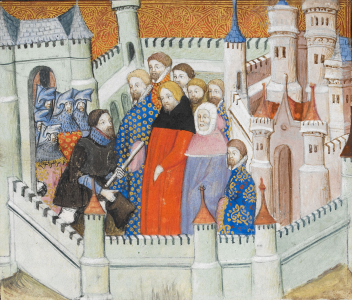 Around 1401. Jean Creton Chronicler. The Capture and Death of King Richard. King Richard II of England (standing in black and red) surrendering to King Henry IV of England (age 33) (holding the white staff) at Flint Castle [Map].
Around 1401. Jean Creton Chronicler. The Capture and Death of King Richard. King Richard II of England (standing in black and red) surrendering to King Henry IV of England (age 33) (holding the white staff) at Flint Castle [Map]. 

On 19 Aug 1493 Frederick "Peaceful or Fat" Habsburg III Holy Roman Emperor (age 77) died. His son Maximilian Habsburg I Holy Roman Emperor (age 34) succeeded I Holy Roman Emperor.
Henry Machyn's Diary. 19 Aug 1553. [The xix day were arraigned at Westminster hall sir Andrew Dudley (age 46), sir John Gates (age 49), sir Harry] Gattes, ser Thomas Palmer, and cast [to be hanged and] quartered.
Note. Sir John Gates and sir Thomas Palmer. These two knights were beheaded with the duke of Northumberland on the 22d August. Stowe in his Summarie preserves a soubriquet of the latter: he was called, "buskin Palmer." See a note regarding him in the Life of Lord Grey of Wilton, p. 3. He had received a pardon for all treasons, &c. Feb. 1551–2.
On 19 Aug 1553 Andrew Dudley (age 46) was tried at Westminster Hall [Map].
Henry Machyn's Diary. 19 Aug 1557. The xviiij day of August was the hers for the kyng of Denmarke fenysshed, with wax, the wyche was never sen shyche on [seen such a one] in England of that fassyon, of sqware tapurs, and xxj baners and baners rolles of all ther leneges and mareges in baner-rolles. The sam nyght was the durge, my lord tresorer cheyff morner; and after that my lord Darcy (age 60), ser Robart Uxinbryge (age 49), ser Edmond Peckam (age 62), ser [Robert] Freston (age 57), cofferer to the quen (age 41), and ser Recherd Sowthwell (age 54), ser Arthur Darcy (age 62), and mony nobull men and gentyllmen alle in blake; and my lord of London (age 57) begane the durge, with ys myter [on] alle the durge wylle; and after the durge alle the haroldes and the lordes whent to the bysshope of London('s) plasse and dronke; and iiij goodly whytt branchys, and vj dosen torchys, and the qwer hangyd with blake and armes; and vj pilers covered with velvet, and a goodly hers-cloth of tensell, the crosse of cloth of selver; and the morow masse, and a goodly sermon, and after to my lord('s) of London to dener for the kyng of Denmarke('s) obseque and fenerall, and a mageste and valans fryng of gold, and x dosen pensels, and x dosen skochyns of armes.



On 05 Dec 1560 Francis II King France King Consort Scotland (age 16) died. His brother Charles IX King France (age 10) succeeded IX King France: Capet Valois Angoulême. Mary Queen of Scots (age 17) no longer Queen of France she returned to Scotland arriving at Leith 19 Aug 1561 after having been in France for thirteen years.

On 19 Aug 1565 Thomas Keyes (age 41) and Mary Grey (age 20) were married. Elizabeth Stafford (age 19) and Ursula Stafford (age 12) were witnesses. The difference in their ages was 21 years. She the daughter of Henry Grey 1st Duke of Suffolk and Frances Brandon Duchess of Suffolk. She a great granddaughter of King Henry VII of England and Ireland. 


On 19 Aug 1596 Princess Elizabeth Stewart Queen Bohemia was born to King James I of England and Ireland and VI of Scotland (age 30) and Anne of Denmark Queen Consort Scotland England and Ireland (age 21) at Falkland Palace, Falkland, Fife.

On 19 Aug 1622 James Compton 3rd Earl of Northampton was born to Spencer Compton 2nd Earl of Northampton (age 21) and Mary Beaumont Countess of Northampton (age 18).

On 19 Aug 1631 John Dryden was born to Erasmus Dryden (age 45) in The Rectory Aldwincle Thrapston, Northamptonshire.
Evelyn's Diary. 19 Aug 1649. I went to salute the French King (age 10) and the Queen Dowager (age 47); and, on the 21st, returned in one of the Queen's coaches with my Lord Germain, Duke of Buckingham (age 21), Lord Wentworth (age 37), and Mr. Croftes (age 38), since Lord Croftes.


On 19 Aug 1659 the Battle of Winnington Bridge was fought between the 5000 strong Parliamentary Army of General John Lambert (age 39) and the 4000 strong Royalist army led by George Booth 1st Baron Delamer (age 36).
Brothers Piers Legh (age 28) and Thomas Leigh fought. Thomas Leigh was killed.
Edward Morgan of Golden Grove was killed. He was buried at the Church of St Deiniol, Hawarden, Flintshire.
Pepy's Diary. 19 Aug 1662. By and by to sit at the office; and Mr. Coventry (age 34) did tell us of the duell between Mr. Jermyn (age 26), nephew to my Lord St. Albans (age 57), and Colonel Giles Rawlins, the latter of whom is killed, and the first mortally wounded, as it is thought. They fought against Captain Thomas Howard (age 31), my Lord Carlisle's (age 33) brother, and another unknown; who, they say, had armour on that they could not be hurt, so that one of their swords went up to the hilt against it. They had horses ready, and are fled. But what is most strange, Howard sent one challenge, but they could not meet, and then another, and did meet yesterday at the old Pall Mall [Map] at St. James's, and would not to the last tell Jermyn what the quarrel was; nor do any body know. The Court is much concerned in this fray, and I am glad of it; hoping that it will cause some good laws against it.


Pepy's Diary. 19 Aug 1663. Up betimes, and my wife up and about the house, Susan beginning to have her drunken tricks, and put us in mind of her old faults and folly and distractednesse, which we had forgot, so that I became mightily troubled with her. This morning came my joyners to new lay the floors, and begun with the dining room. I out and see my viall again, and it is very well, and to Mr. Hollyard (age 54), and took some pills of him and a note under his hand to drink wine with my beere, without which I was obliged, by my private vowe, to drink none a good while, and have strictly observed it, and by my drinking of small beere and not eating, I am so mightily troubled with wind, that I know not what to do almost.
Evelyn's Diary. 19 Aug 1671. To Council. The letters of Sir Thomas Modiford (age 51) were read, giving relation of the exploit at Panama, which was very brave; they took, burned, and pillaged the town of vast treasures, but the best of the booty had been shipped off, and lay at anchor in the South Sea, so that, after our men had ranged the country sixty miles about, they went back to Nombre de Dios, and embarked for Jamaica. Such an action had not been done since the famous Drake.
On 19 Aug 1673 Louise Kéroualle 1st Duchess Portsmouth (age 23) was created 1st Duke Portsmouth, 1st Earl Fareham, 1st Baron Petersfield by King Charles II of England Scotland and Ireland (age 43) for life for being his mistress and for having given birth to his son Charles Lennox 1st Duke Richmond (age 1).
Evelyn's Diary. 19 Aug 1674. His Majesty (age 44) told me how exceedingly the Dutch were displeased at my treatise of the "History of Commerce;" that the Holland Ambassador had complained to him of what I had touched of the Flags and Fishery, etc., and desired the book might be called in; while on the other side, he assured me he was exceedingly pleased with what I had done, and gave me many thanks. However, it being just upon conclusion of the treaty of Breda (indeed it was designed to have been published some months before and when we were at defiance), his Majesty (age 44) told me he must recall it formally; but gave order that what copies should be publicly seized to pacify the Ambassador, should immediately be restored to the printer, and that neither he nor the vender should be molested. The truth is, that which touched the Hollander was much less than what the King (age 44) himself furnished me with, and obliged me to publish, having caused it to be read to him before it went to press; but the error was, it should have been published before the peace was proclaimed. The noise of this book's suppression made it presently to be bought up, and turned much to the stationer's advantage. It was no other than the preface prepared to be prefixed to my "History of the Whole War;" which I now pursued no further.
On 19 Aug 1694 Elizabeth Shirley Countess Northampton was born to Robert Shirley (age 20) and Anne Ferrers (age 16).

On 19 Aug 1721 Thomas Deacon (age 70) died. He was buried at Peterborough Cathedral [Map]. Powdered Wig. Hand On Skull. Elbow Reclining Figure. Heeled Shoes. Sculpted by Robert Taylor (age 7).
Thomas Deacon: Around 1651 he was born. B 1653 he and Mary Havey were married. Before 1718 he was appointed High Sheriff of Northamptonshire.
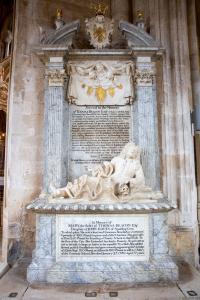
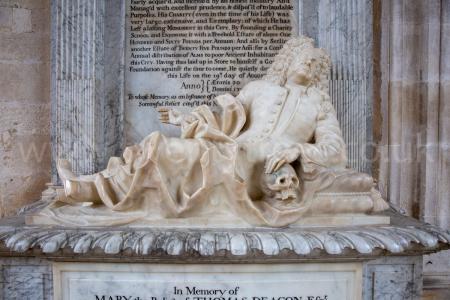
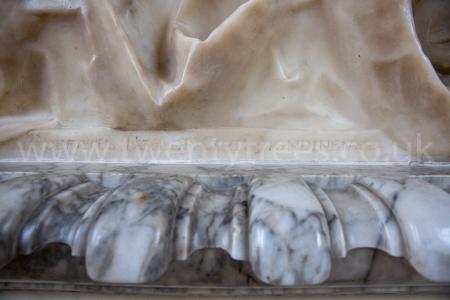
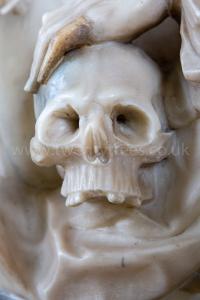
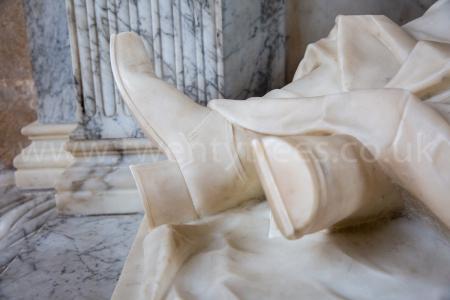
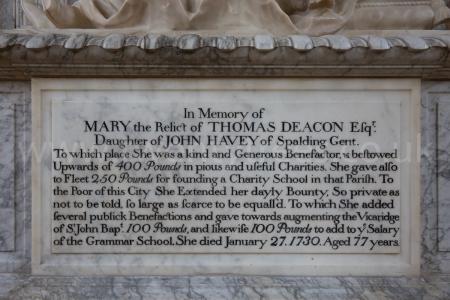
On 19 Aug 1769 Margaret Yorke Lady Heathcote (age 36) died. On 05 May 1772 Bridget White Lady Heathcote (age 67) died. Monument to in St Mary's Church, Edith Weston, Rutlandshire [Map].
Margaret Yorke Lady Heathcote:
On 23 Mar 1733 she was born to Philip Yorke 1st Earl of Hardwicke and Margaret Cocks Countess Hardwicke. On 22 Jun 1749 Gilbert Heathcote 3rd Baronet and she were married. She the daughter of Philip Yorke 1st Earl of Hardwicke and Margaret Cocks Countess Hardwicke.
On 22 Jun 1749 Gilbert Heathcote 3rd Baronet and she were married. She the daughter of Philip Yorke 1st Earl of Hardwicke and Margaret Cocks Countess Hardwicke.
Bridget White Lady Heathcote: In 1705 she was born to Thomas White of Walling Wells in Nottinghamshire. In 1720 John Heathcote 2nd Baronet and she were married. She by marriage Lady Heathcote of London.
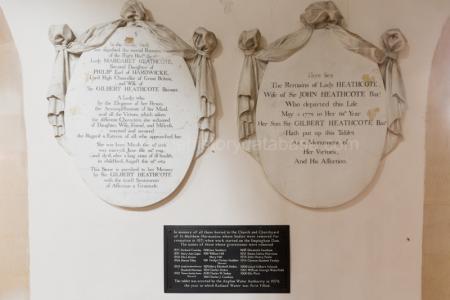
On 19 Aug 1779 John Cust 1st Earl Brownlow was born to Brownlow Cust 1st Baron Brownlow (age 34) and Frances Bankes Baroness Brownlow.
After 19 Aug 1843. St Mary's Church, Chirk [Map]. Memorial Ascension Window to Colonel Robert Myddelton-Biddulph (age 38), and his sons Robert Myddelton-Biddulph and Gilbert Hugh Myddleton-Biddulph commissioned by Fanny Mostyn-Owen (age 36) wife and mother respectively.
Robert Myddelton-Biddulph: In 1843 he was born to Colonel Robert Myddelton-Biddulph and Fanny Mostyn-Owen. On 04 Sep 1863 he died at Malta. He was buried at St Mary's Church, Chirk.
Gilbert Hugh Myddleton-Biddulph: On 15 Dec 1848 he was born to Colonel Robert Myddelton-Biddulph and Fanny Mostyn-Owen. On 11 Feb 1878 he died at Rome.
Fanny Mostyn-Owen: On 18 Aug 1807 she was born to William Mostyn-Owen of Woodhouse. On 31 May 1832 Colonel Robert Myddelton-Biddulph and she were married. On 04 Nov 1887 she died.
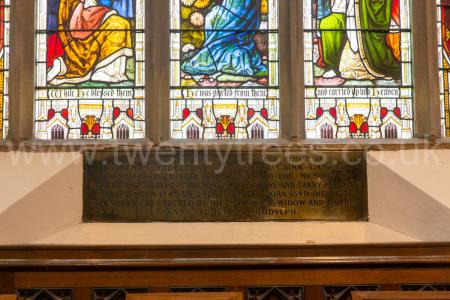
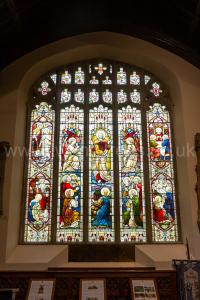
After 19 Aug 1843. St Mary's Church, Chirk [Map]. Monument to Charlotte Myddelton (deceased). She the last remaining member of the Myddelton family who married Robert Myddelton-Biddulph by which Chirk Castle [Map] came into the possession of the Biddulph family who adopted the surname Myddelton-Biddulph.
Robert Myddelton-Biddulph: In Mar 1761 he was born. On 20 Dec 1796 Richard Myddelton died unmarried. His sister Charlotte Myddelton and her husband Robert Myddelton-Biddulph inherited Chirk Castle. On 24 Dec 1801 he and Charlotte Myddelton were married. She the heiress of her father Richard Myddelton and brother Richard Myddelton by which she and her husband inherited Chirk Castle. On 30 Aug 1814 he died.
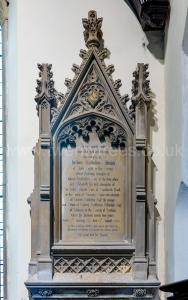
After 19 Aug 1843. St Mary's Church, Chirk [Map]. Memorial to Charlotte Myddelton (deceased).
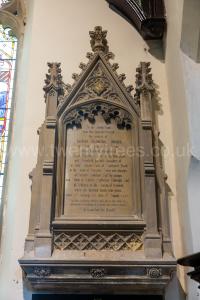
On 19 Aug 1857 Edgar Vincent 1st Viscount D'Abernon was born to Frederick Vincent 11th Baronet (age 59) and Maria Copley Young (age 37).
On 19 Aug 1876 Muriel Finch-Hatton was born to Murray Finch-Hatton 7th Earl Nottingham 12th Earl Winchilsea (age 25) and Edith Harcourt Countess Winchelsea and Nottingham (age 20).

Births on the 19th August
On 19 Aug 1012 Baldwin "The Good" V Count Flanders was born to Baldwin "Bearded" IV Count Flanders (age 32) and Ogive Luxemburg Countess Flanders at Arras.
On 19 Aug 1454 François Savoy was born to Louis Savoy I Count Savoy (age 41) and Anne Cyprus Countess Savoy (age 35) at Chambéry.
On 19 Aug 1515 Louise Valois was born to King Francis I of France (age 20) and Claude Valois Orléans Queen Consort France (age 15). Coefficient of inbreeding 4.50%. 
On 19 Aug 1523 Anne Drury was born to William Drury (age 23) and Elizabeth Sothill (age 18).
On 19 Aug 1557 Frederick Württemberg I Duke Württemberg was born to George I of Württemberg-Mömpelgard (age 59) and Barbara of Hesse (age 21).
On 19 Aug 1558 François Bourbon Condé Prince Conti was born to Louis Bourbon Prince Condé (age 28) and Eléanor de Roucy de Roye Princess Condé (age 23).
Before 19 Aug 1590 Henry Rich 1st Earl Holland was born to Robert Rich 1st Earl Warwick (age 30) and Penelope Devereux Countess Devonshire (age 27).

On 19 Aug 1596 Princess Elizabeth Stewart Queen Bohemia was born to King James I of England and Ireland and VI of Scotland (age 30) and Anne of Denmark Queen Consort Scotland England and Ireland (age 21) at Falkland Palace, Falkland, Fife.

On 19 Aug 1622 James Compton 3rd Earl of Northampton was born to Spencer Compton 2nd Earl of Northampton (age 21) and Mary Beaumont Countess of Northampton (age 18).

On 19 Aug 1631 John Dryden was born to Erasmus Dryden (age 45) in The Rectory Aldwincle Thrapston, Northamptonshire.
On 19 Aug 1646 John Flamsteed was born in Denby [Map].
On 19 Aug 1656 Christopher Wandesford 1st Viscount Castlecomer was born to Christopher Wandesford 1st Baronet (age 28) and Eleanor Lowther.
On 19 Aug 1673 Arabella Cavendish was born to Henry Cavendish 2nd Duke Newcastle upon Tyne (age 43) and Frances Pierrepont Duchess Newcastle upon Tyne (age 42).

Before 19 Aug 1685 Richard Evelyn of Dublin was born to George Evelyn of Nutfield (age 43).
On 19 Aug 1690 Charles Churchill was born to John Churchill 1st Duke of Marlborough (age 40) and Sarah Jennings Duchess of Marlborough (age 30).
On 19 Aug 1692 Margaret Nairne Murray was born to William Murray 2nd Lord Nairne.
On 19 Aug 1694 Elizabeth Shirley Countess Northampton was born to Robert Shirley (age 20) and Anne Ferrers (age 16).

On 19 Aug 1697 Richard Wingfield 1st Viscount Powerscourt was born to Edward Wingfield and Eleanor Gore.
On 19 Aug 1710 Charles Wyndham 2nd Earl Egremont was born to William Wyndham 3rd Baronet (age 22) and Catherine Seymour (age 17).

On 19 Aug 1711 Stuarta Shirley was born to Robert Shirley 1st Earl Ferrers (age 60) and Selina Finch Countess Ferrers (age 30).

On 19 Aug 1711 Edward Boscawen was born to Hugh Boscawen 1st Viscount Falmouth (age 31) and Charlotte Godfrey Viscountess Falmouth.
Before 19 Aug 1721 Catherine Stanhope was born to James Stanhope 1st Earl Stanhope and Lucy Pitt Countess Stanhope (age 29).
On 19 Aug 1721 James Stanhope was born to James Stanhope 1st Earl Stanhope and Lucy Pitt Countess Stanhope (age 29).
On 19 Aug 1726 Jane Hamilton was born to Archibald Hamilton (age 53).
On 19 Aug 1773 George Child-Villiers 5th Earl Jersey was born to George Bussy Villiers 4th Earl Jersey (age 38) and Frances Twysden (age 20).


On 19 Aug 1773 Charlotte Margaret Gage was born to General Thomas Gage (age 54).
On 19 Aug 1773 Valentine Lawless 2nd Baron Cloncurry was born to Nicholas Lawless 1st Baron Cloncurry (age 37) and Margaret Browne Baroness Cloncurry (age 37) at Merrion Square, Dublin in Dublin.
On 19 Aug 1777 Francis I of the Two Sicilies was born to Ferdinand I of the Two Sicilies (age 26) and Maria Caroline of Austria Queen Consort of Naples and Sicily (age 25).
On 19 Aug 1778 Sophie Fredericka Caroline Luise Saxe Coburg Gotha was born to Francis Saxe Coburg Gotha I Duke Saxe Coburg Gotha (age 28) and Augusta Reuss Duchess Saxe Coburg Gotha (age 21).
On 19 Aug 1778 James Edward Harris 2nd Earl Malmesbury was born to James Harris 1st Earl Malmesbury (age 32) and Harriet Maria Amyand Countess Malmesbury (age 17).
On 19 Aug 1779 John Cust 1st Earl Brownlow was born to Brownlow Cust 1st Baron Brownlow (age 34) and Frances Bankes Baroness Brownlow.
In 19 Aug 1784 Robert Stewart 2nd Earl Castle Stewart was born to Andrew Thomas Stewart 1st Earl Castle Stewart (age 58).
On 19 Aug 1805 George Richards Welstead was born to Marion Welstead (age 27) and Susannah Osborne (age 25).
On 19 Aug 1808 Isabella Somerset Anne Frances was born to Henry Charles Somerset 6th Duke Beaufort (age 41) and Charlotte Sophia Leveson-Gower Duchess Beaufort (age 37).
On 19 Aug 1809 Colonel George Talbot was born to Dean Charles Talbot (age 39) and Elizabeth Somerset (age 36).

On 19 Aug 1810 George Henry Cavendish was born to William Cavendish (age 27) and Louisa Ocallaghan.
On 19 Aug 1813 Thomas Edward Colebrooke 4th Baronet was born to Henry Thomas Colebrooke (age 48) in Calcutta, India.
On 19 Aug 1819 Brownlow Charles Bertie was born to Montagu Bertie 5th Earl of Abingdon (age 35) and Emily Gage Countess of Abingdon.
On 19 Aug 1837 Isabella Stephenson was born to Henry Frederick Stephenson (age 46) and Mary Keppel (age 33).

On 19 Aug 1841 Edward Percy Seymour was born to Edward Adolphus Seymour 12th Duke of Somerset (age 36) and Jane Georgiana Sheridan Duchess Somerset (age 31).
On 19 Aug 1841 Hervey Charles Pechell was born to Reverend Horace Robert Pechell (age 49) and Caroline Mary Kerr.
On 19 Aug 1844 Adelbert Wellington Brownlow Cust 3rd Earl Brownlow was born to John Hume Egerton (age 31) and Marianne Margaret Compton (age 27).
On 19 Aug 1845 William Percival Wynn was born to Spencer Bulkeley Wynn 3rd Baron Newborough (age 42) and Frances Maria De Winton Baroness Newborough. Coefficient of inbreeding 3.12%. 
On 19 Aug 1845 Reverend Brooke de Malpas Grey-Egerton 13th Baronet was born to Reverend William Henry Egerton (age 33).
On 19 Aug 1848 Ralph Frankland-Payne-Gallwey 3rd Baronet was born to William Payne-Gallwey 2nd Baronet (age 41) and Emily Anne Frankland-Russell Lady Frankland (age 26).
On 19 Aug 1851 Bernard Coleridge 2nd Baron Coleridge was born to John Duke Coleridge 1st Baron Coleridge (age 30) and Jane Fortescue Seymour Baroness Coleridge (age 26).
On 19 Aug 1856 Guy Thomas Saunders Sebright 12th Baronet was born to Thomas Gage Saunders Sebright 8th Baronet (age 54).
On 19 Aug 1857 Edgar Vincent 1st Viscount D'Abernon was born to Frederick Vincent 11th Baronet (age 59) and Maria Copley Young (age 37).
On 19 Aug 1858 Lionel Dawson-Damer 5th Earl of Portarlington was born to Lionel Dawson-Damer 4th Earl of Portarlington (age 26) and Harriet Lydia Robinson Montagu Countess Portarlington.
On 19 Aug 1859 William Sidney 5th Baron De Lisle and Dudley was born to Philip Sidney 2nd Baron De Lisle and Dudley (age 31) and Mary Foulis (age 33). He a great grandson of King William IV of the United Kingdom.
On 19 Aug 1865 Maud Marianne Calvert was born to Archibald Motteux Calvert (age 37).
On 19 Aug 1866 Reginald Charles Fulke Greville aka Maugham was born illegitimately to Reginald James Macartney Greville-Nugent (age 17).
On 19 Aug 1876 Muriel Finch-Hatton was born to Murray Finch-Hatton 7th Earl Nottingham 12th Earl Winchilsea (age 25) and Edith Harcourt Countess Winchelsea and Nottingham (age 20).

On 19 Aug 1882 Gerald William Addington 5th Viscount Sidmouth was born to Gerald Addington 4th Viscount Sidmouth (age 28).
On 19 Aug 1889 Fenella Hepburn-Stuart-Forbes-Trefusis was born to Charles Hepburn-Stuart-Forbes-Trefusis 21st Baron Clinton (age 26) and Jane Grey McDonnell Baroness Clinton (age 26). Coefficient of inbreeding 1.57%. 
On 19 Aug 1892 Roland James Corbet 5th Baronet was born to Walter Orlando Corbet 4th Baronet (age 36).
On 19 Aug 1893 Lovel William Coke was born to Thomas Coke 2nd Earl of Leicester (age 70) and Georgina Caroline Cavendish Countess Leicester (age 41).

On 19 Aug 1898 Maud Lillian Elfreda Mary Wentworth-Fitzwilliam was born to William Charles de Meuron "Billy" Wentworth-Fitzwilliam 7th and 5th Earl Fitzwilliam (age 26) and Maud Frederica Elizabeth Dundas Countess Fitzwilliam (age 21).

On 19 Aug 1900 Thomas Cholmondeley 4th Baron Delamere was born to Hugh Cholmondeley 3rd Baron Delamere (age 30) and Florence Ann Cole Baroness Delamere (age 22).
On 19 Aug 1905 Mary Kathleen Lane-Fox Viscountess Bridgeman was born to George Lane-Fox 1st Baron Bingley (age 34) and Mary Agnes Emily Wood Baroness Bingley (age 28).
On 19 Aug 1925 Michael David Hogg 8th Baronet was born to Arthur Ramsey Hogg 7th Baronet (age 28).
On 19 Aug 1935 Victor Ambrus was born in Budapest, Hungary.
On 19 Aug 1945 Arthur Charles Valerian Wellesley 9th Duke of Wellington was born to Arthur Valerian Wellesley 8th Duke Wellington (age 30).
On 19 Aug 1950 John Charles Josslyn Ramsden 9th Baronet was born to Caryl Oliver Imbert Ramsden 8th Baronet (age 35).
On 19 Aug 1966 Robert James Renwick 3rd Baron Renwick was born to Harry Andrew Renwick 2nd Baron Renwick (age 30).
On 19 Aug 1966 John Lyon-Dalberg-Acton 5th Baron Acton was born to Richard Lyon-Dalberg-Acton 4th Baron Acton (age 25).
Marriages on the 19th August
On 19 Aug 1371 Louis Bourbon II Duke Bourbon (age 34) and Anne Auvergne Duchess Bourbon (age 13) were married. She by marriage Duchess Bourbon. The difference in their ages was 20 years. He the son of Peter Bourbon Duke Bourbon and Isabella Valois Duchess Bourbon (age 58). He a great x 3 grandson of King Henry III of England. 
On 19 Aug 1479 Jean V Count Armagnac and Jeanne Foix were married. The difference in their ages was 34 years. She the daughter of Gaston IV Count Foix and Eleanor Trastámara Queen Consort Navarre. He the son of John IV Count Armagnac and Isabella Évreux Countess Armagnac. They were first cousin once removed.

Before 19 Aug 1565 Christopher Wandesford 1st Baronet and Eleanor Lowther were married.
On 19 Aug 1565 Thomas Keyes (age 41) and Mary Grey (age 20) were married. Elizabeth Stafford (age 19) and Ursula Stafford (age 12) were witnesses. The difference in their ages was 21 years. She the daughter of Henry Grey 1st Duke of Suffolk and Frances Brandon Duchess of Suffolk. She a great granddaughter of King Henry VII of England and Ireland. 


On 19 Aug 1568 John "Younger" Oldenburg Duke Schleswig Holstein Sonderburg (age 23) and Elisabeth of Brunswick-Grubenhagen (age 18) were married. He the son of Christian III King Denmark and Dorothea of Saxe Lauenburg Queen Consort Denmark and Norway (age 57).
Before 19 Aug 1606 Thomas More (age 75) and Mary Scrope (age 72) were married. She a great x 5 granddaughter of King Edward III of England. 
Before 19 Aug 1622 Spencer Compton 2nd Earl of Northampton (age 21) and Mary Beaumont Countess of Northampton (age 18) were married. He the son of William Compton 1st Earl of Northampton and Elizabeth Spencer Countess Northampton.


Before 19 Aug 1697 Edward Wingfield and Eleanor Gore were married.
On 19 Aug 1708 Robert Marsham 1st Baron Romney (age 22) and Elizabeth Shovell Baroness Romney were married.
Before 19 Aug 1710 William Wyndham 3rd Baronet (age 22) and Catherine Seymour (age 17) were married. She the daughter of Charles Seymour 6th Duke of Somerset (age 48) and Elizabeth Percy Duchess Somerset (age 43).

On 19 Aug 1742 John Thomas (age 30) and Anne Clayton Lady Blackwell were married at the Chapel Royal, Whitehall Palace. There was no issue. She the sister of his former pupil William Clayton 1st Baronet.
On 19 Aug 1776 Charles Dillon Lee 12th Viscount Dillon (age 30) and Henrietta Maria Phipps (age 19) were married. They were fourth cousins. He a great x 2 grandson of King Charles II of England Scotland and Ireland. She a great x 2 granddaughter of King James II of England Scotland and Ireland. 
Before 19 Aug 1805 Marion Welstead (age 27) and Susannah Osborne (age 25) were married.
On 19 Aug 1810 Philip Sydney Pierrepont (age 24) and Georgiana Browne were married. He the son of Charles Medows aka Pierrepont 1st Earl Manvers (age 72) and Anne Mills Countess Manvers (age 63).
On 19 Aug 1815 Reverend Leveson-Vernon-Harcourt (age 27) and Caroline Mary Peachey were married. He the son of Archbishop Edward Venables-Vernon-Harcourt (age 57) and Anne Leveson-Gower (age 54). She a great x 3 granddaughter of King Charles II of England Scotland and Ireland. 
On 19 Aug 1819 John Eliot 1st Earl St Germans (age 57) and Harriet Carew were married.
On 19 Aug 1834 Reverend Henry Chaplin (age 45) and Caroline Horatia Ellice (age 19) were married. The difference in their ages was 25 years.
Before 19 Aug 1851 Henry Birkbeck of Stoke Holy Cross (age 30) and Mary Anne Hamond were married.
On 19 Aug 1873 Archibald Palmer and Augusta Amelia Shirley Shirley (age 23) were married. She the daughter of Washington Sewallis Shirley 9th Earl Ferrers and Annabella Augusta Chichester Countess Ferrers.


On 19 Aug 1892 Lieutenant Mark McDonnell (age 40) and Emily Fanny Dorothy Osborn were married. He the son of Mark Kerr aka McDonnell 5th Earl of Antrim and Jane Macan Countess of Antrim. They were first cousins.
On 06 Nov 1895 Charles Richard John Spencer-Churchill 9th Duke of Marlborough (age 23) and Consuelo Vanderbilt Duchess of Marlborough (age 18) were married at St Thomas' Church New York. She by marriage Duchess Marlborough. The marriage arranged by Mary "Minnie" Fiske Stevens (age 42) and encouraged by mother Alva Erskine Smith (age 42). The marriage was unhappy; they seperated in 1906 and the mariage was annulled on 19 Aug 1926. He the son of George Charles Spencer-Churchill 8th Duke of Marlborough and Albertha Frances Anne Hamilton Duchess of Marlborough (age 48). He a great x 5 grandson of King Charles II of England Scotland and Ireland. 
On 19 Aug 1913 Walter Yarde-Buller (age 54) and Alianore Chandos-Pole Lady Lethbridge (age 44) were married. They were first cousins. She a great x 5 granddaughter of King Charles II of England Scotland and Ireland. 
On 19 Aug 1918 Osborne De Vere Beauclerk 12th Duke St Albans (age 43) and Beatrix Petty-Fitzmaurice Duchess St Albans (age 41) were married. She the daughter of Henry Petty-Fitzmaurice 5th Marquess Lansdowne (age 73) and Maud Evelyn Hamilton Marchioness Lansdowne (age 68). He the son of William Amelius Aubrey Beauclerk 10th Duke St Albans and Grace Bernal Duchess St Albans (age 70). He a great x 5 grandson of King Charles II of England Scotland and Ireland. She a great x 5 granddaughter of King Charles II of England Scotland and Ireland. 
Deaths on the 19th August
On 19 Aug 768 Eadberht King of Northumbria died. His son Oswulf King of Northumbria succeeded King Northumbria. He reigned for less than a year being murdered on 25 Jul 759.
On 19 Aug 1033 Bishop Leofsy died.
On 19 Aug 1186 Geoffrey Plantagenet 2nd Duke Brittany (age 27) died at Paris [Map].
On 19 Aug 1245 Raymond Berenguer Provence IV Count Provence (age 47) died.
On 19 Aug 1284 Alfonso Plantagenet (age 10) died at Windsor, Berkshire [Map]. He was buried at Westminster Abbey [Map].
On 19 Aug 1298 Saint Louis Capet Bishop Toulose (age 24) died.
On 19 Aug 1334 John Barcelona (age 30) died.
On either 05 Aug 1388 or 19 Aug 1388 a Scottish army commanded by John Swinton defeated an English army commanded by Henry "Hotspur" Percy (age 24) during the Battle of Otterburn at Otterburn [Map]. Henry "Hotspur" Percy (age 24) and his brother Ralph Percy (age 29) were captured as was Matthew Redman (age 60). The English suffered 1000 killed, 2000 captured. The Scottish 100 killed, 200 captured.
On the Scottish side James Douglas 2nd Earl Douglas (age 30) was killed. His sister Isabel Douglas Countess Mar (age 28) succeeded Countess Mar.
John Dunbar 1st Earl of Moray (age 46) fought.
On 19 Aug 1438 Marie Valois (age 44) died.
On 19 Aug 1493 Frederick "Peaceful or Fat" Habsburg III Holy Roman Emperor (age 77) died. His son Maximilian Habsburg I Holy Roman Emperor (age 34) succeeded I Holy Roman Emperor.
On 15 or 19 Aug 1531 Thomas Bilney (age 36) was burned at the stake at Norwich, Norfolk [Map].
On 19 Aug 1537 Thomas Cornwall 8th Baron Burford (age 70) died at Acton. His son Richard Cornwall 9th Baron Burford (age 44) succeeded 9th Baron Burford.
On 19 Aug 1557 Francis Savage (age 29) died at Elmley Castle, Worcestershire.
Before 19 Aug 1560 Alice Squier Baroness North died.
On 19 Aug 1560 Elizabeth Dudley Baroness Stourton (age 72) died.
On 05 Dec 1560 Francis II King France King Consort Scotland (age 16) died. His brother Charles IX King France (age 10) succeeded IX King France: Capet Valois Angoulême. Mary Queen of Scots (age 17) no longer Queen of France she returned to Scotland arriving at Leith 19 Aug 1561 after having been in France for thirteen years.

On 19 Aug 1562 William Clopton of Kentwell Hall (age 53) died.
On 19 Aug 1566 Elisabeth Guelph (age 40) died.
Before 19 Aug 1586 William Hay 5th Lord Hay (age 48) died. His son William Hay 6th Lord Hay (age 25) succeeded 6th Lord Hay of Yester.
On 19 Aug 1591 Margaret Howard (age 29) died.
On 19 Aug 1606 Thomas More (age 75) died.
On 19 Aug 1619 Thomas Liddell of Ravensworth Castle (age 64) died.
On 19 Aug 1622 Frederick Wettin (age 26) was killed.
On 19 Aug 1625 Count Enno III of East Frisia (age 61) died.
On 19 Aug 1633 Elizabeth Home Countess Suffolk (age 34) died.
Before 19 Aug 1651 Adam de Colone (age 79) died. He was buried on 19 Aug 1651.
On 19 Aug 1659 Edmund Prideaux 1st Baronet died. His son Edmund Prideaux 2nd Baronet (age 25) succeeded 2nd Baronet Prideaux of Forde Abbey in Dorset.
On 19 Aug 1659 the Battle of Winnington Bridge was fought between the 5000 strong Parliamentary Army of General John Lambert (age 39) and the 4000 strong Royalist army led by George Booth 1st Baron Delamer (age 36).
Brothers Piers Legh (age 28) and Thomas Leigh fought. Thomas Leigh was killed.
Edward Morgan of Golden Grove was killed. He was buried at the Church of St Deiniol, Hawarden, Flintshire.
On 19 Aug 1702 Anthony Grey 1453 1490 11th Earl Kent (age 57) died. His son Henry Grey 1st Duke Kent (age 31) succeeded 12th Earl Kent. Jemima Crew Marchioness Kent (age 27) by marriage Countess Kent.

On 19 Aug 1704 James Power 3rd Earl Tyrone (age 37) died without male issue. Earl Tyrone.
On 19 Aug 1710 Lady Mary Fane (age 36) died.
On 19 Aug 1721 Thomas Deacon (age 70) died. He was buried at Peterborough Cathedral [Map]. Powdered Wig. Hand On Skull. Elbow Reclining Figure. Heeled Shoes. Sculpted by Robert Taylor (age 7).
Thomas Deacon: Around 1651 he was born. B 1653 he and Mary Havey were married. Before 1718 he was appointed High Sheriff of Northamptonshire.






On 19 Aug 1723 Anna Maria Webb Countess Derwentwater (age 31) died.
On 19 Aug 1726 Robert Digby (age 34) died.
Before 19 Aug 1730 Gore Boothby (age 32) died. He was buried at St Oswald's Church, Ashbourne [Map].
On 19 Aug 1734 Penelope Stonhouse Baroness Gower (age 29) died.
On 19 Aug 1734 Penelope Dashwood (age 47) died.
On 19 Aug 1752 George Pelham-Clinton (age 6) died.
On 19 Aug 1755 Catherine Knatchbull died.
On 19 Aug 1758 Mary Hay 14th Countess Erroll died at Slains Castle, Slains. Her great nephew James Hay 15th Earl Erroll (age 32) succeeded 15th Earl Erroll.
On 19 Aug 1767 Edward Lye (age 73) died.
On 19 Aug 1769 Margaret Yorke Lady Heathcote (age 36) died. On 05 May 1772 Bridget White Lady Heathcote (age 67) died. Monument to in St Mary's Church, Edith Weston, Rutlandshire [Map].
Margaret Yorke Lady Heathcote:
On 23 Mar 1733 she was born to Philip Yorke 1st Earl of Hardwicke and Margaret Cocks Countess Hardwicke. On 22 Jun 1749 Gilbert Heathcote 3rd Baronet and she were married. She the daughter of Philip Yorke 1st Earl of Hardwicke and Margaret Cocks Countess Hardwicke.
On 22 Jun 1749 Gilbert Heathcote 3rd Baronet and she were married. She the daughter of Philip Yorke 1st Earl of Hardwicke and Margaret Cocks Countess Hardwicke.
Bridget White Lady Heathcote: In 1705 she was born to Thomas White of Walling Wells in Nottinghamshire. In 1720 John Heathcote 2nd Baronet and she were married. She by marriage Lady Heathcote of London.

On 19 Aug 1775 Christine Anna Luise Oswaldine Salm (age 68) died.
On 19 Aug 1808 Francis Reynolds-Moreton 3rd Baron Ducie (age 69) died. His son Thomas Reynolds-Moreton 1st Earl Ducie (age 31) succeeded 4th Baron Ducie. Frances Herbert Baroness Ducie Tortworth (age 26) by marriage Baroness Ducie.
On 19 Aug 1809 Henry Crichton-Stuart (age 32) died.
On 19 Aug 1812 John Pigott (age 79) died.
On 19 Aug 1828 William Lupton III (age 51) died.
On 19 Aug 1839 Reverend Bourchier William Wrey (age 78) died.
On 19 Aug 1842 Admiral Henry Digby (age 72) died.
On 19 Aug 1843 Charlotte Myddelton (age 73) died. Her son Colonel Robert Myddelton-Biddulph (age 38) inherted Chirk Castle [Map].
On 19 Aug 1845 William Gordon (age 80) died.
On 19 Aug 1846 Reverend Charles Boothby (age 60) died.
On 19 Aug 1850 Charles Vincent Loraine 7th Baronet (age 43) died.
On 19 Aug 1855 Anthony Maurice William Ashley-Cooper (age 20) died.
On 19 Aug 1864 Robert Dennett Rodney 6th Baron Rodney (age 44) died. His son George Bridges Rodney 7th Baron Rodney (age 7) succeeded 7th Baron Rodney of Rodney Stoke in Somerset.
On 19 Aug 1874 Henry Webb 7th Baronet (age 68) died. Baronet Webb of Odstock in Wiltshire extinct.
On 19 Aug 1875 Henry Blundell Leigh (age 52) died.
On 19 Aug 1882 Anna Margaret Anson Countess Camden (age 85) died.
On 19 Aug 1891 William Edward Burnaby 4th Baronet (age 67) died.
After 19 Aug 1898 Sophia Grenfell (age 68) died.
In 19 Aug 1900 James Sherwood Westmacott (age 76) died at Longlands Chesterfield [Map].
On 19 Aug 1904 Evelyn Nina Frances Baker died.
On 19 Aug 1908 Frederick Brydges Major Henniker 5th Baronet (age 46) died. His brother Arthur John Henniker-Hughan 6th Baronet (age 42) succeeded 6th Baronet Henniker of Newton Hall in Essex.
On 19 Aug 1921 Captain Chandos Graham Temple-Gore-Langton (age 47) died.
On 19 Aug 1927 John Manners-Sutton 3rd Baron Manners (age 75) died. His son Francis Henry Manners 4th Baron Manners (age 30) succeeded 4th Baron Manners.
On 19 Aug 1927 Alexander Edward Lane-Fox Pitt-Rivers (age 71) died.
On 19 Aug 1930 Leonara Caroline Digby Baroness Ashburton (age 85) died.
On 19 Aug 1936 Hugh Patrick Lygon (age 31) died.
On 19 Aug 1943 Major John Hamilton-Russell (age 32) was killed accidentally whilst on active service.
On 19 Aug 1991 Alexander Wallace Fielding (age 72) died.
On 19 Aug 1998 Anne Palairet Countess of Oxford and Asquith (age 81) died.